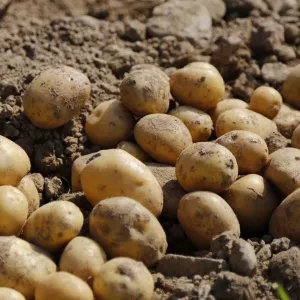Empowering African Plant Protection Agencies to Combat Devastating Potato Pest
The International Institute of Tropical Agriculture (IITA) is empowering National Plant Protection Organizations in Africa to effectively detect and manage Potato Cyst Nematodes (PCN), a microscopic pest devastating potato crops across the region. Nematodes are tiny worms that attack potato roots, stunting their growth and can wipe out potato yields by up to 100 percent. PCN has already been reported

Empowering African Plant Protection Agencies to Combat Devastating Potato Pest
The International Institute of Tropical Agriculture (IITA) is empowering National Plant Protection Organizations in Africa to effectively detect and manage Potato Cyst Nematodes (PCN), a microscopic pest devastating potato crops across the region.
Nematodes are tiny worms that attack potato roots, stunting their growth and can wipe out potato yields by up to 100 percent.
PCN has already been reported to be highly prevalent in 4 countries in East and Southern Africa. PCN is a quarantine pest that infects and feeds on potato roots, causing significant yield losses and threatening regional trade due to strict border phytosanitary controls. Early detection and management are critical to protect farmer livelihoods and regional potato markets.
A WTO’s Standards and Trade Development Facility project coordinated by the Food and Agriculture Organization (FAO) involves technical training that is spearheaded by the IITA and icipe through the NemAfrica lab to equip national plant protection agencies in 12 countries with cutting-edge diagnostic tools and management strategies to tackle the PCN threat. The project is a collaborative effort that additionally involves the International Potato Center (CIP), the Kenya Plant Health Inspectorate Service (KEPHIS) and CABI.
Potatoes are an essential staple food in Eastern and Southern Africa. The crop supports the livelihoods of an estimated 800,000 smallholder farmers, covering over 800 000 hectares of land. Nearly 9 million tons of potatoes are produced in the region annually. However, the future of the potato is in peril with the silent and deadly spread of PCN.
The PCN remains a hidden enemy to potato production, however. It often goes unnoticed or is mistaken for other issues, such as sick or tired land that has poor soil fertility. Affected plants are stunted and become yellow, producing smaller tubers and significant damage to yield. The project emphasizes the urgent need for creating awareness to guide effective management strategies. The training program focuses on the accurate assessment and diagnosis of PCN. Stakeholders across the potato value chain — from farmers to traders and policymakers — have been encouraged to learn how to recognize PCN symptoms. Furthermore, the project has underscored the need to promote regional cooperation to prevent the spread of PCN.
“By strengthening diagnostic capacity and fostering regional collaboration, this project is a vital step toward safeguarding potato production and trade in East and Southern Africa,” said Dr. Harun Murithi, Consultant Crop Health Specialist – Disease and Pest Management at IITA. “Accurate identification of PCN will enable timely interventions, protecting farmers’ livelihoods and contributing to food security.”
The project focuses on raising awareness and strengthening the capacity of public and private sector potato value chain organizations to collaboratively address phytosanitary risks of PCN and other emerging pests. The project is enhancing the diagnostic capabilities of plant health professionals and border inspectors to accurately identify PCN to effectively manage it.
Technicians and laboratory staff are being trained on sample collection, extraction, and identification of PCN. Essential diagnostic equipment and consumables to conduct this work, such as the key extraction tool known as the Fenwick can and sieves are provided to National Plant Protection labs. In addition, the project is supporting detection surveys in major potato-growing regions in the target countries in Eastern and Southern Africa to map the presence of PCN.
Covering 12 countries selected for their regional importance and trade links, the project recently held a training workshop in Nairobi which brought together representatives from Kenya, Uganda, Burundi, South Sudan, Rwanda, Ethiopia, Zimbabwe, Zambia, Malawi, Mozambique, Tanzania, and Lesotho to build foundational diagnostic skills for National Plant Protection Organizations. Following this training countries have begun conducting national detection surveys with support from NemAfrica. Zimbabwe has completed sample extraction and identification, while Zambia and Malawi are currently in progress. Ethiopia has completed sample collection, with Lesotho, Mozambique and Uganda already planned.

